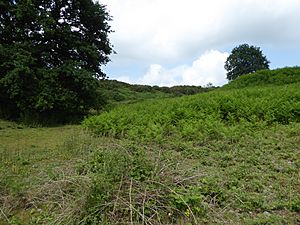Blackborough End Pit facts for kids
| Site of Special Scientific Interest | |
 |
|
| Area of Search | Norfolk |
|---|---|
| Interest | Geological |
| Area | 13.2 hectares (33 acres) |
| Notification | 1993 |
| Location map | Magic Map |
Blackborough End Pit is a very important natural site located south-east of King's Lynn in Norfolk, England. It covers about 13.2 hectares (which is roughly the size of 20 football fields!). This area is officially known as a Site of Special Scientific Interest (SSSI) because of its amazing geology. It's also recognized as a Geological Conservation Review site, meaning it's super important for understanding Earth's history.
Contents
What Makes Blackborough End Pit Special?
This site is like an open book that tells a story about Earth's past. It helps scientists understand how the land was shaped by erosion a very long time ago. Erosion is when natural forces like wind or water wear away rocks and soil.
A Look Back in Time: The Lower Cretaceous Period
The rocks at Blackborough End Pit show us what happened during the Lower Cretaceous period. This was a time in Earth's history that lasted from about 145 to 100 million years ago. Imagine dinosaurs roaming the Earth!
Layers of Time: Rock Formations
At this site, you can see different layers of rock. One important layer is called the Carstone Formation. This rock layer formed about 110 million years ago, during a part of the Cretaceous period called the Albian stage.
Below the Carstone Formation, there's an older layer called the Leziate Beds. These beds are even older, forming over 130 million years ago during the Valanginian stage.
The Missing Link: An Unconformity
What makes Blackborough End Pit truly special is something called an unconformity. This means there's a gap in the rock layers. Normally, between the Carstone Formation and the Leziate Beds, there should be another layer called the Dersingham Beds. But at this site, the Dersingham Beds are completely missing!
This missing layer tells scientists that there was a long period of time when no new rock was formed, or perhaps older rocks were worn away by erosion before new ones were laid down. It's like pages are missing from Earth's history book right at this spot, showing us a unique geological event.
Visiting Blackborough End Pit
It's important to know that Blackborough End Pit is on private land. This means there is no public access for visitors. Its special geological features are protected for scientific study.
 | Kyle Baker |
 | Joseph Yoakum |
 | Laura Wheeler Waring |
 | Henry Ossawa Tanner |

